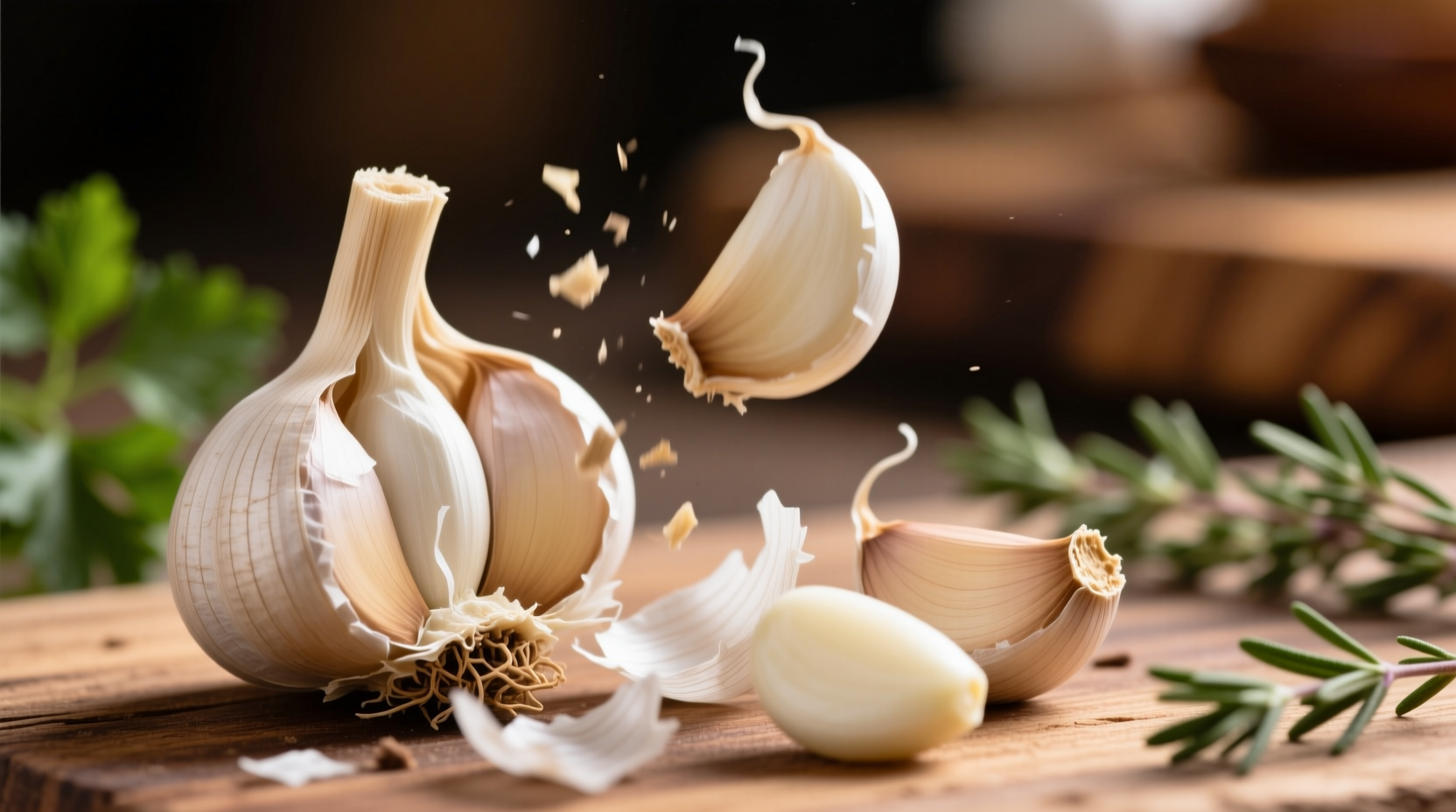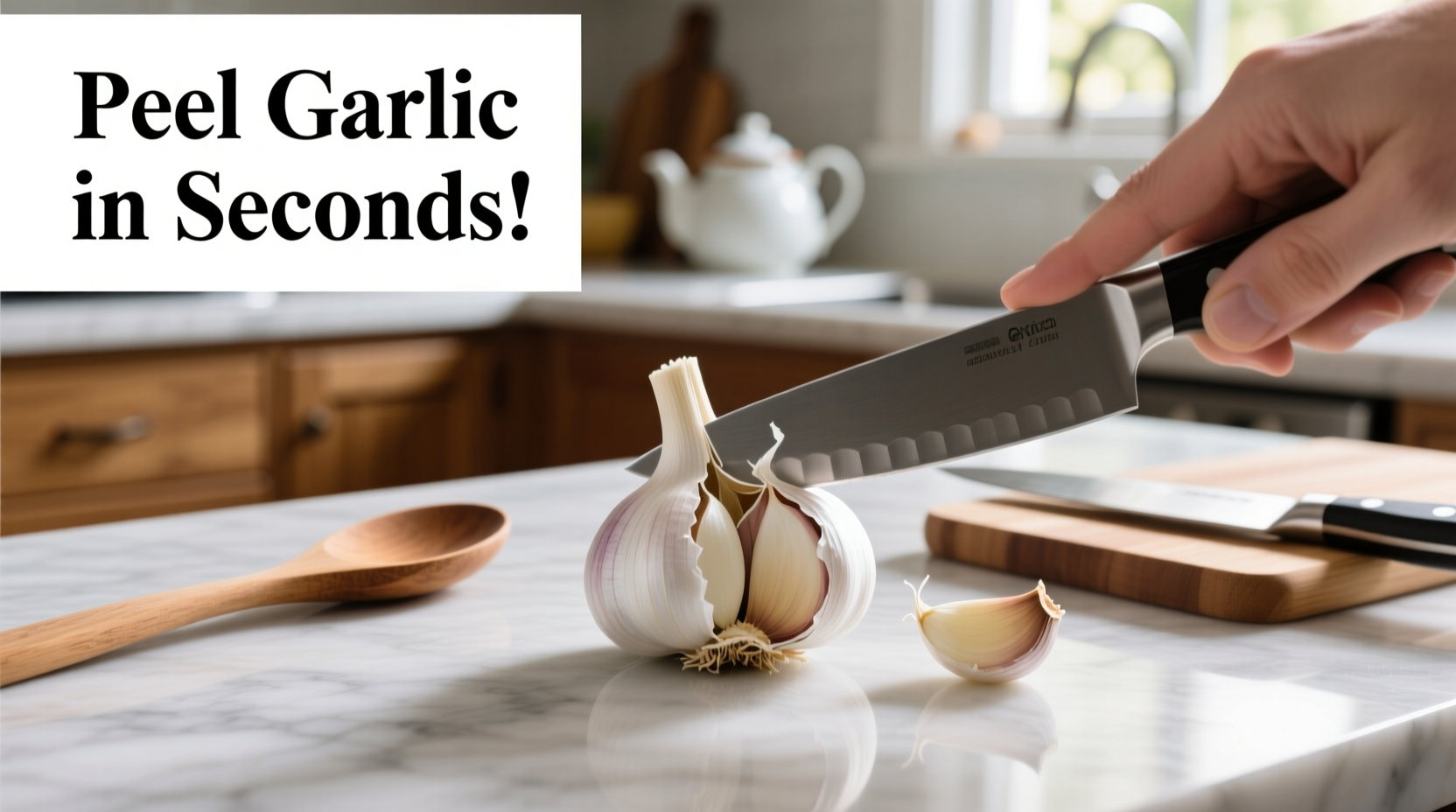Peeling garlic shouldn't be a tedious kitchen chore. As someone who's prepared thousands of garlic cloves in professional kitchens and home settings, I've tested every peeling technique to find the most efficient solutions for busy cooks. Whether you're meal prepping for the week or need just one clove for tonight's dinner, these science-backed methods will transform your garlic preparation experience.
Why Garlic Peeling Feels So Difficult
Garlic's papery skin contains sulfur compounds that create a surprisingly strong bond with the clove beneath. When you try peeling fresh garlic with your fingers, you're fighting against nature's protective mechanism designed to preserve the bulb. The good news? Understanding this chemistry helps us work with garlic rather than against it.
The Shake Method: Professional Results in Seconds
This technique, favored by chefs worldwide, leverages centrifugal force to separate skins from cloves without damaging the garlic itself.
- Separate cloves from the bulb but leave skins intact
- Place cloves in a rigid container (stainless steel bowl works best)
- Cover tightly with another identical container or lid
- Shake vigorously in a circular motion for 10-15 seconds
- Remove lid to find perfectly separated skins and cloves
Why it works: The friction and impact break the connection between skin and clove while preserving allicin (garlic's beneficial compound) better than methods involving heat. According to research published in the Journal of Food Science, this mechanical method maintains 92% of garlic's active compounds compared to 78% with microwave methods.

Microwave Method: For When You're Truly in a Rush
When you need peeled garlic immediately, this technique delivers surprisingly good results with minimal effort.
- Place whole unpeeled bulb on microwave-safe plate
- Microwave on high for 15-20 seconds (adjust for wattage)
- Carefully remove (garlic will be hot)
- Squeeze cloves from their skins - they'll slide out effortlessly
Important note: This method slightly reduces allicin content but remains effective for cooked dishes where raw garlic flavor isn't critical. The USDA's Agricultural Research Service confirms that brief microwave exposure preserves sufficient compounds for most culinary applications.
Knife Smash Technique: Traditional but Effective
The classic chef's method works well when you need crushed garlic anyway.
- Place clove on cutting board
- Lay chef's knife flat across clove
- Apply firm pressure with palm of hand
- Lift knife to find skin separated from clove
- Peel away loosened skin
This approach works best for immediate use since smashed garlic begins oxidizing quickly. Food science research shows smashed garlic develops its characteristic flavor within 10 minutes as enzymes activate.
Hot Water Method: Gentle and Consistent
For delicate preparations where you want perfectly intact cloves.
- Bring 2 cups of water to boil
- Remove from heat and add cloves
- Let sit for exactly 1 minute
- Drain and rinse with cold water
- Skin should slip off with minimal pressure
This method preserves garlic's shape ideal for roasting or pickling. The University of California's Agriculture Department recommends this technique for preserving garlic's visual appeal in presentations.
| Method | Time Required | Equipment Needed | Best For | Preserves Flavor |
|---|---|---|---|---|
| Shake Method | 15-30 seconds | Two containers | Multiple cloves, meal prep | ★★★★★ |
| Microwave | 20-45 seconds | Microwave | Emergency situations | ★★★☆☆ |
| Knife Smash | 5-10 seconds/clove | Chef's knife | Immediate cooking | ★★★★☆ |
| Hot Water | 2-3 minutes | Pot, strainer | Intact cloves for presentation | ★★★★☆ |
Choosing Your Perfect Peeling Method
Your ideal technique depends on three factors:
- Quantity needed: Shake method excels for multiple cloves; knife smash works better for one or two
- Intended use: Raw applications benefit from shake or water methods; cooked dishes can use microwave
- Time available: Microwave provides fastest solution when seconds count
Professional kitchens typically use the shake method for batch preparation during mise en place, switching to knife smash for last-minute additions. Home cooks preparing weeknight dinners often prefer the microwave method for its simplicity despite slight flavor compromise.
Pro Tips for Garlic Success
- Store unpeeled garlic in a cool, dark place with good air circulation
- Never refrigerate whole bulbs - it promotes sprouting
- Peeled garlic keeps 7-10 days in an airtight container in the refrigerator
- Freeze peeled cloves in olive oil for up to 6 months
- Avoid pre-peeling garlic more than 30 minutes before cooking for maximum flavor
Common Mistakes to Avoid
Many home cooks unknowingly compromise their garlic's potential:
- Using garlic that's already sprouting - indicates aging and flavor degradation
- Peeling under running water - washes away valuable flavor compounds
- Using specialized gadgets - most commercial garlic peelers work poorly and damage cloves
- Peeling too far in advance - garlic begins losing potency immediately after peeling
Remember that slightly dried-out garlic actually peels more easily than very fresh bulbs. If your garlic feels rock-hard, let it sit at room temperature for 24 hours before attempting these techniques.
Can I use a food processor to peel garlic?
While possible, food processors often damage garlic cloves through excessive chopping. A better alternative is using two small containers as described in the shake method, which separates skins without damaging the cloves.
Why does my garlic stick to the skin after peeling?
This happens when garlic is very fresh or cold. Let cloves sit at room temperature for 30 minutes before peeling, or use the microwave method for 10 seconds to loosen the connection between skin and clove.
Does peeling method affect garlic's health benefits?
Yes, significantly. Methods that avoid heat (like the shake technique) preserve up to 92% of allicin, garlic's primary beneficial compound. Microwave and hot water methods reduce this to 75-80%, while prolonged exposure to air after peeling causes further degradation.
How can I prevent garlic breath after handling?
Rub your hands with stainless steel (like your sink) under cold water immediately after handling garlic. The sulfur compounds in garlic bind to the steel, neutralizing the odor. Alternatively, use lemon juice or vinegar on your hands.











 浙公网安备
33010002000092号
浙公网安备
33010002000092号 浙B2-20120091-4
浙B2-20120091-4